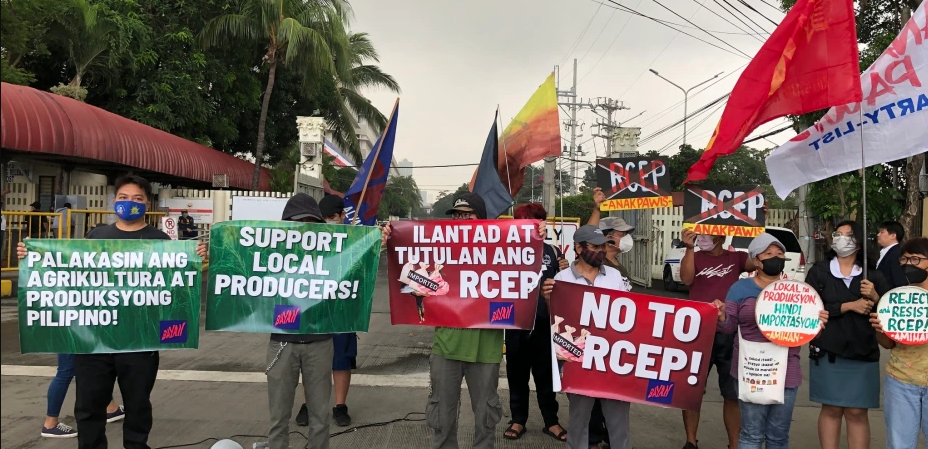No to RCEP! don’t make the Philippines an “ukay-ukay” Republic!!
The Kilusang Magbubukid ng Pilipinas - 31 January 2023
No to RCEP! don’t make the Philippines an “ukay-ukay” Republic!!
Last November 2021, during the 18th Congress, various farmers, fishers, workers, civil society, and private sector organizations expressed their opposition to the Regional Comprehensive Economic Partnership (RCEP) free trade agreement. At that time, we urged the Senate to withhold its concurrence with the treaty until the necessary policies, strategies, and programs are emplaced so that the RCEP benefits, and does not harm, the agricultural sector and the economy as a whole.
We pointed out that agriculture provides 25% of all jobs. Together with agribusiness, it accounts for 35% of our Gross Domestic Product. At least 50% of Filipinos depend directly or indirectly on the sector. Also, most poor Filipinos are in rural areas.
Clearly, the promised gains from trade liberalization — following our membership in the World Trade Organization (WTO) in 1995 and subsequent regional and bilateral free trade agreements (FTAs) — have not materialized. Our trade performance has actually deteriorated. Our agricultural trade deficit has ballooned to nearly nine billion US dollars annually. Exports have not significantly expanded beyond traditional items like banana, pineapple, and coconut-based products. Meanwhile, our capacity to supply foreign markets with competitive products has paled in comparison to our neighbors. In turn, we have become a dumping ground for imports of practically all agricultural commodities – rice, corn, pork, chicken, fish, salt, onions, garlic, mung bean, peanuts, etc.
RCEP proponents claim that we have not made any major commitments in agriculture beyond those already found in existing FTAs. They add that sensitive products like rice, meats, vegetables, and corn are exempted from tariff reduction. Hence, they conclude, there is nothing in RCEP to worry about.
In fact, what they mean is that things will probably not get any worse.
That is of little consolation to the agricultural sector. Recently, we have seen big supply gaps and price spikes in sugar, onions, rice, and eggs. Things could worsen unless we act resolutely and fix the ills plaguing agriculture. More so, if our competitors in the region – in contrast to our complacency – continue to innovate and displace us in markets here and abroad.
Dire warnings about the cost of not joining RCEP are exaggerated, if not imagined. Almost all the trade concessions offered by our trading partners under RCEP will remain available to us through our existing FTAs with them, either directly or through ASEAN. Foreign investors who locate their businesses in the country will continue enjoying these preferential arrangements, even if we are outside RCEP.
New trade or market access opportunities – if any – under RCEP cover a tiny percentage of our agricultural tariff lines and trade value. They also offer minimal tariff cuts, most of which will be phased over as long as twenty years. Moreover, there is no guarantee of their benefit to us, because other RCEP member countries will enjoy the same privileges. They will be the gainers, and we will be the losers if they are more competitive than us.
For industry, as with agriculture, there is a real danger of imports displacing our local output – since RCEP will eliminate tariffs on 93% of our industrial tariff lines. This could result in massive job losses and bankruptcies of small and medium-scale enterprises.
RCEP advocates insist that the trade treaty by itself is good, and that concerns about our readiness to compete should be addressed separately. For us in the agricultural sector who have experienced many broken promises of support, this proposition is unacceptable.
The proponents of RCEP had one year to engage the agri-fisheries sector to attain a mutual understanding on why our commitments under WTO and past FTAs have not worked for us. Yet, they made no serious effort to dialogue meaningfully to avoid past mistakes and to achieve real progress. This shows that the executive is taking our concerns lightly. Nor does it have a credible plan for mitigating threats and maximizing opportunities in RCEP. What has been submitted to the Senate is a wish list of programs that have been on file for many years now, and which — given our worsening trade performance — have clearly failed to address the weaknesses of the agricultural sector and improve its competitiveness.
Last May 2022, President-elect Bongbong Marcos declared his intention to ensure the sector’s preparedness before pushing for Philippine membership in RCEP.
Under these circumstances, it will be foolhardy to dive into the RCEP bandwagon. Let us not put the cart before the horse. The lives and welfare of millions of farmers, fishers, workers, and other stakeholders are at stake!
We, therefore, urge our esteemed Senators to vote NO to RCEP!
31 January 2023






